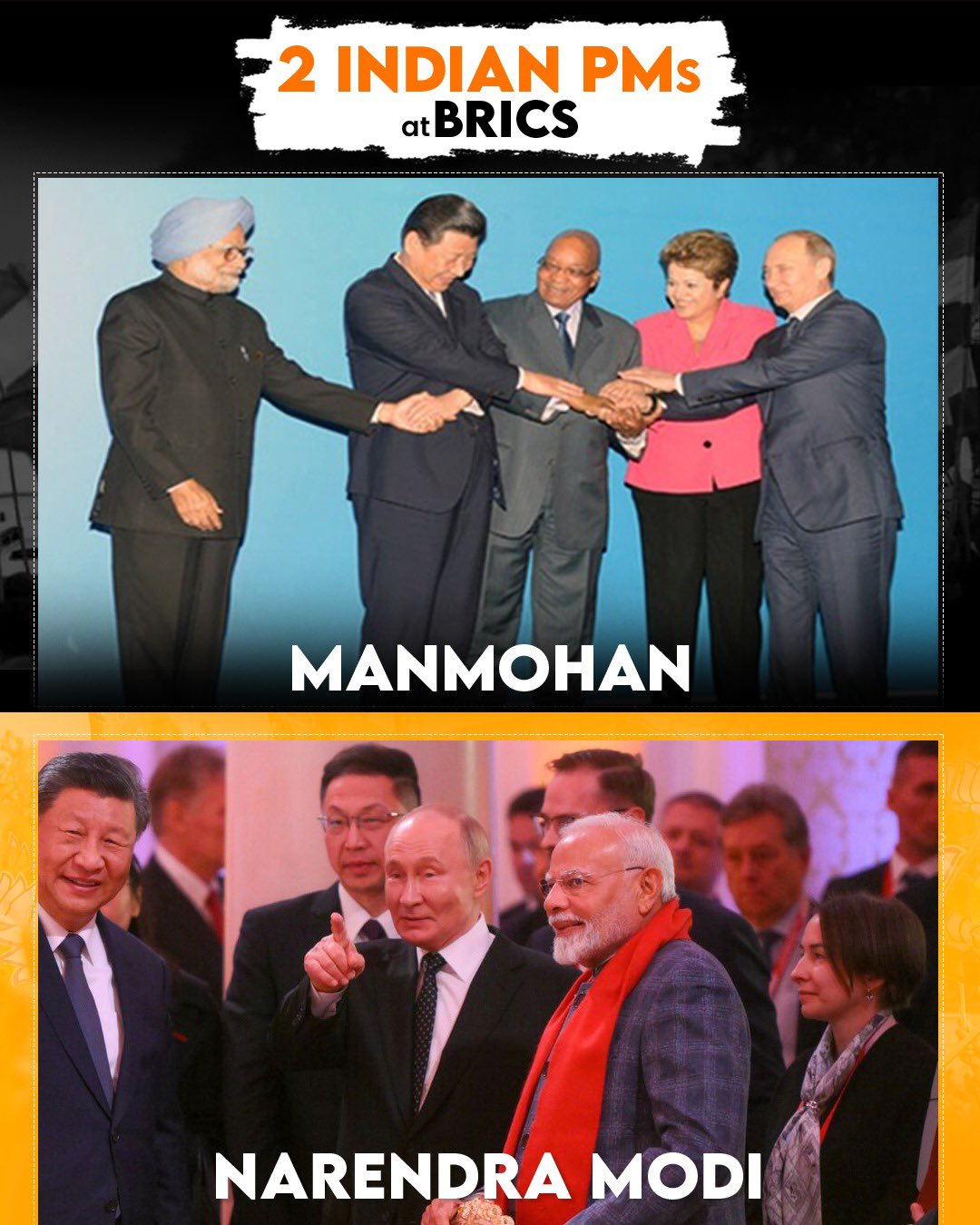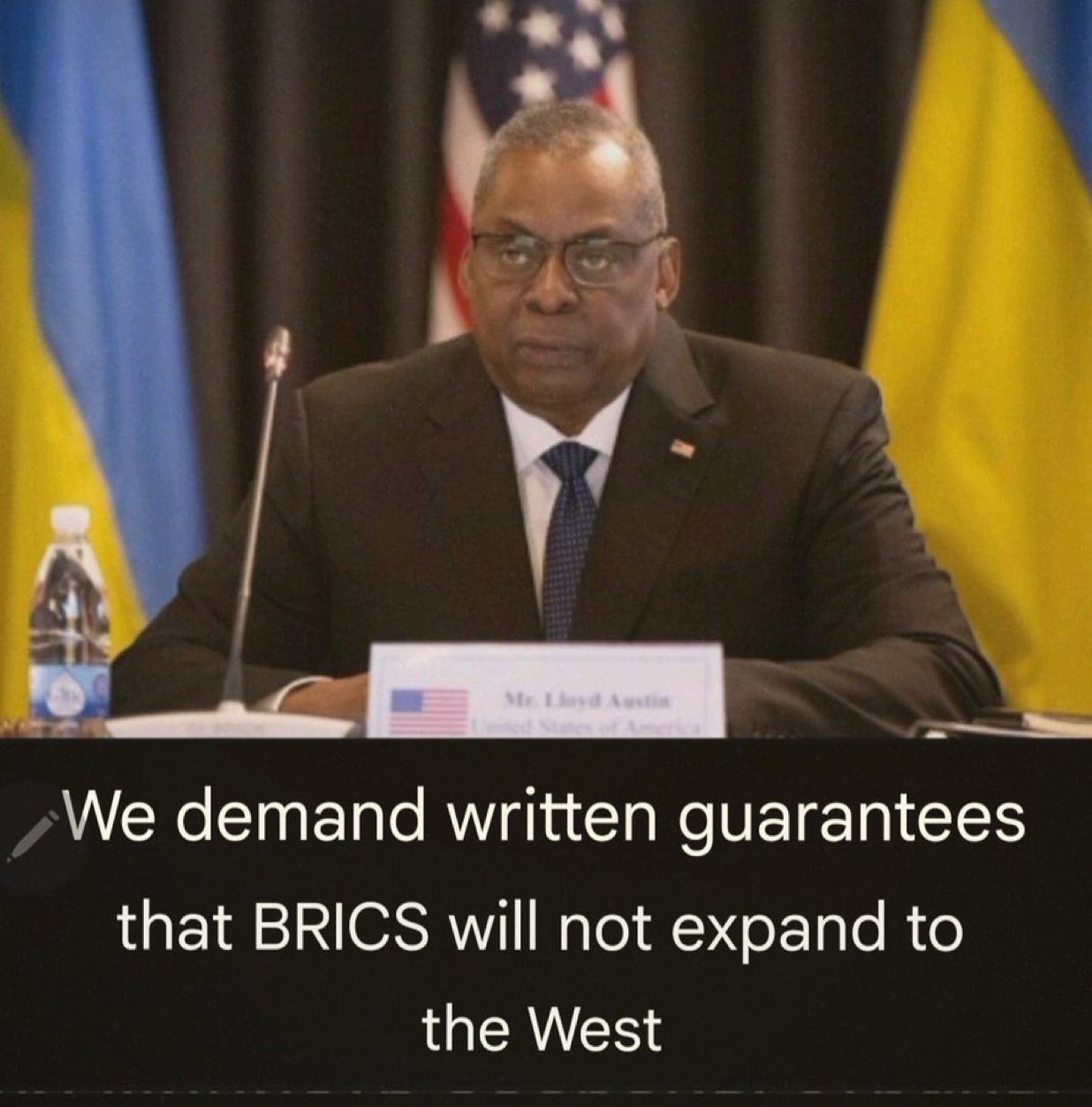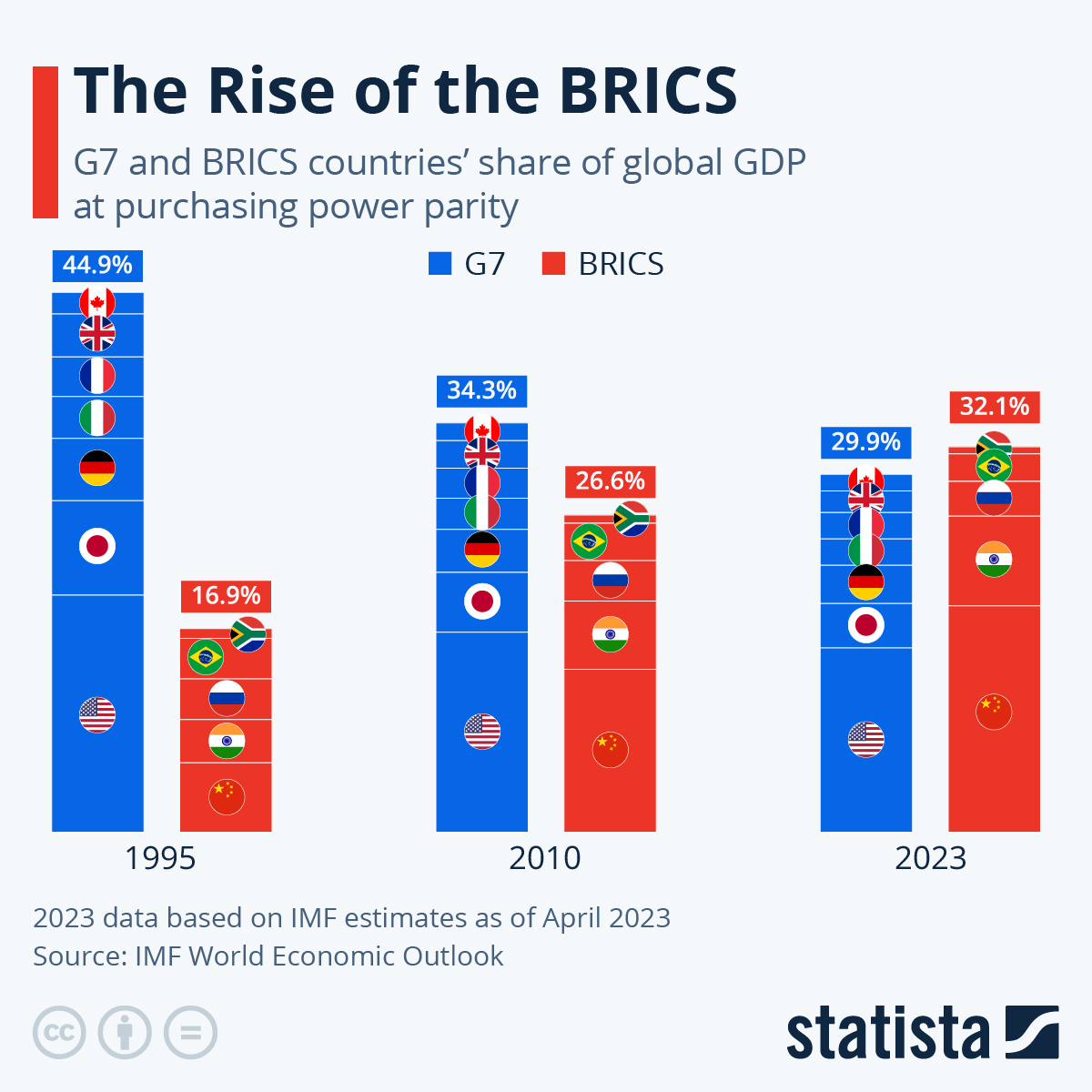No actually. It will retain the founder members acronym
BRICS: News and Discussion
-
Mort Walker
- BRF Oldie
- Posts: 10432
- Joined: 31 May 2004 11:31
- Location: The rings around Uranus.
Re: BRICS: News and Discussion
If Pakistan joins too, then it will be called PRICKS.
Re: BRICS: News and Discussion
Still be pronounced bricks. 
Re: BRICS: News and Discussion
BRICS in numbers:
(Original 5+New 5)
24.5% Export Volume
33.9% Earth Area
36.7% GDP at PPP
39.3% Global Industrial prod
40% Global Oil Production
44.7% Global Wheat harvest
45.2% World Population
(Original 5+New 5)
24.5% Export Volume
33.9% Earth Area
36.7% GDP at PPP
39.3% Global Industrial prod
40% Global Oil Production
44.7% Global Wheat harvest
45.2% World Population
Re: BRICS: News and Discussion
Pulling France into BRICS would be fantastic. Macron has another couple of years in office. Post that perhaps...
Re: BRICS: News and Discussion
BRICS officially adds 13 new nations to the alliance as partner countries (not full members).
 Algeria
Algeria
 Belarus
Belarus
 Bolivia
Bolivia
 Cuba
Cuba
 Indonesia
Indonesia
 Kazakhstan
Kazakhstan
 Malaysia
Malaysia
 Nigeria
Nigeria
 Thailand
Thailand
 Turkey
Turkey
 Uganda
Uganda
 Uzbekistan
Uzbekistan
 Vietnam
Vietnam
Re: BRICS: News and Discussion
Major setback for Pakistan from BRICS in Russia. Pakistan is not listed as a partner country in the BRICS Expansion process. Pakistan had no representation at BRICS in Kazan Russia. India opposed Pakistan’s inclusion.
Re: BRICS: News and Discussion
Indian Government statement on Modi-Xi Jinping meeting in Kazan, Russia.
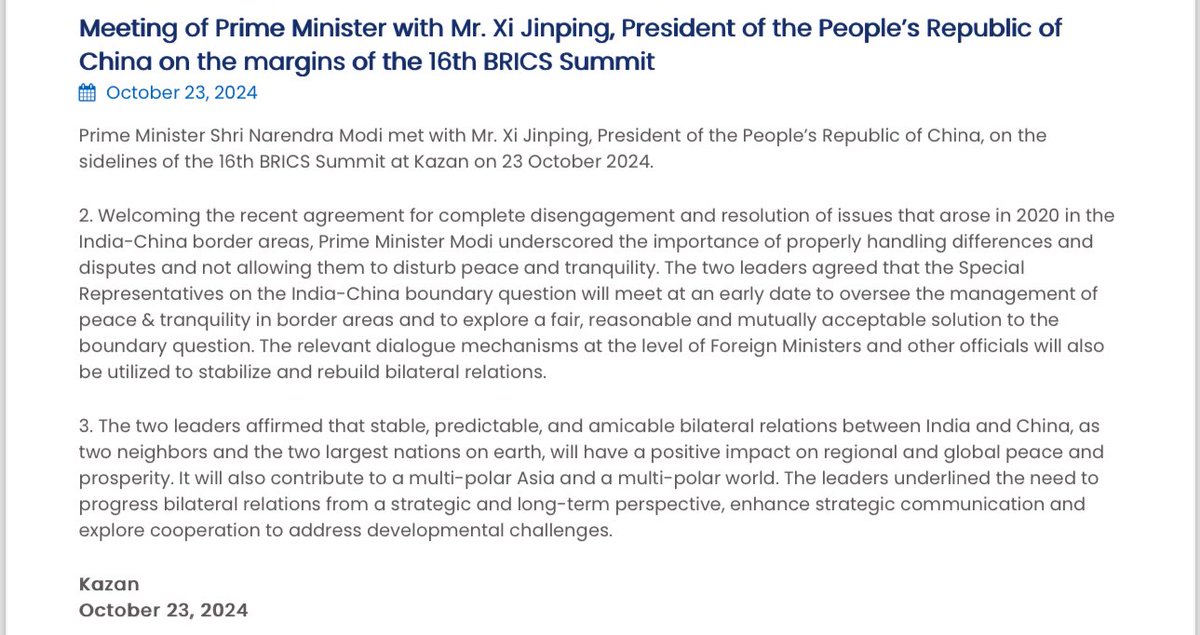
Welcoming the recent agreement for complete disengagement and resolution of issues that arose in 2020 in the India-China border areas, Prime Minister Modi underscored the importance of properly handling differences and disputes and not allowing them to disturb peace and tranquility

Re: BRICS: News and Discussion
Apparently India blocked Turkey as well for it's support to Pakistan
Re: BRICS: News and Discussion
^^^ Also, entry of Canada was discussed too.. 
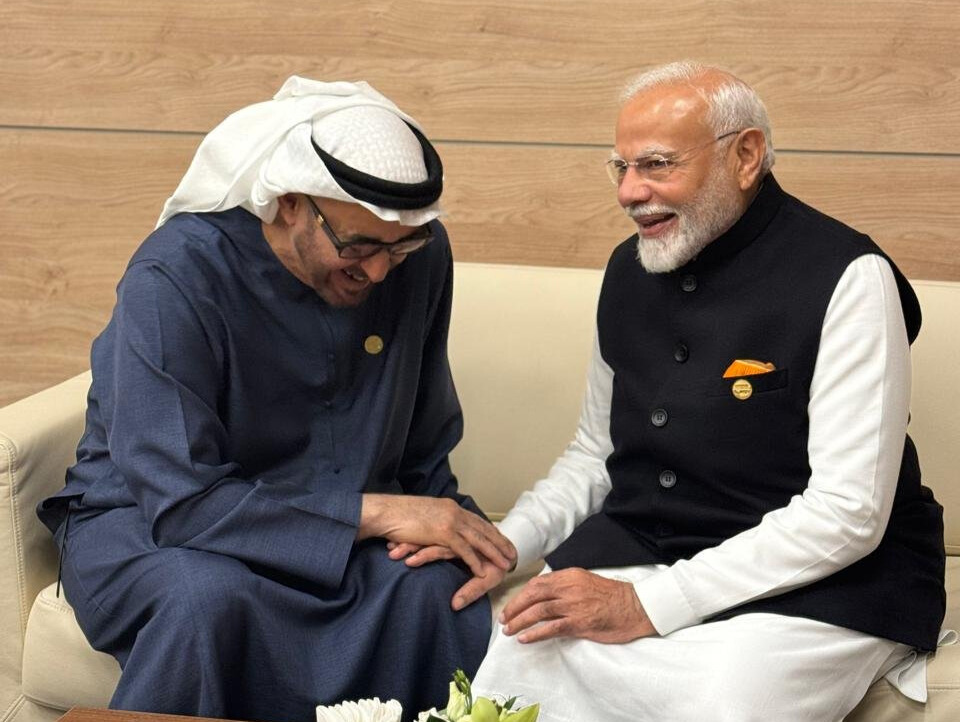

Re: BRICS: News and Discussion
As the "gravitational pull" of the original 5 BRICS continues to get stronger, this can evolve into a new world community of nations to replace the "UN"...with the western countries being the last to join the party.
A completely different evolution (or even outright reversal) from how the UN was formed - by the western nations on the back of the WW2 destruction carried out mostly by the same western nations that could not contain their centuries-old desires to kill each other.
It is tempting to think of the 5 original BRICS nations as a future "P5" of a new world community, but that would be foolish and fall into the same rut as the UN. Rather the BRICS should evolve and coalesce organically based on shared goals for development, security, and equity. In fact, I would say the BRICS should just take the UN's sustainable development goals (SDG) framework and rework it in a manner not dictated by the west.
Re: BRICS: News and Discussion
My thoughts exactly. Digital public goods India is talking about is the right step. West is in denial of these global winds of change, habituated too long on its predatory tactics.
"Kar bhala toh ho bhala"
"Kar bhala toh ho bhala"
Re: BRICS: News and Discussion
Someone show this geography challenged dolt where Brazil is on the world map 
Re: BRICS: News and Discussion
U.S. Secretary of Defense Lloyd Austin and other defense officials have made statements on BRICS and NATO, but I couldn't find direct quotes specifically stating 'direct quotes specifically stating "not allowing BRICS expansion' .. Can you?
The original poster from X (from Kim Dotcom ), IMO is perhaps could be called a "dolt" or worse by making up and posting such comments in the hope some people will fall for it or even amplify it.
Re: BRICS: News and Discussion
Can someone explain to me what is the charter for BRICS. It originally started out as an acronym of countries that were growing economies. What should be the criteria for allowing nations to join this group? What are the common goals?
Re: BRICS: News and Discussion
The decline of the US Dollar is on the horizon
https://www.financialexpress.com/policy ... e/3648619/

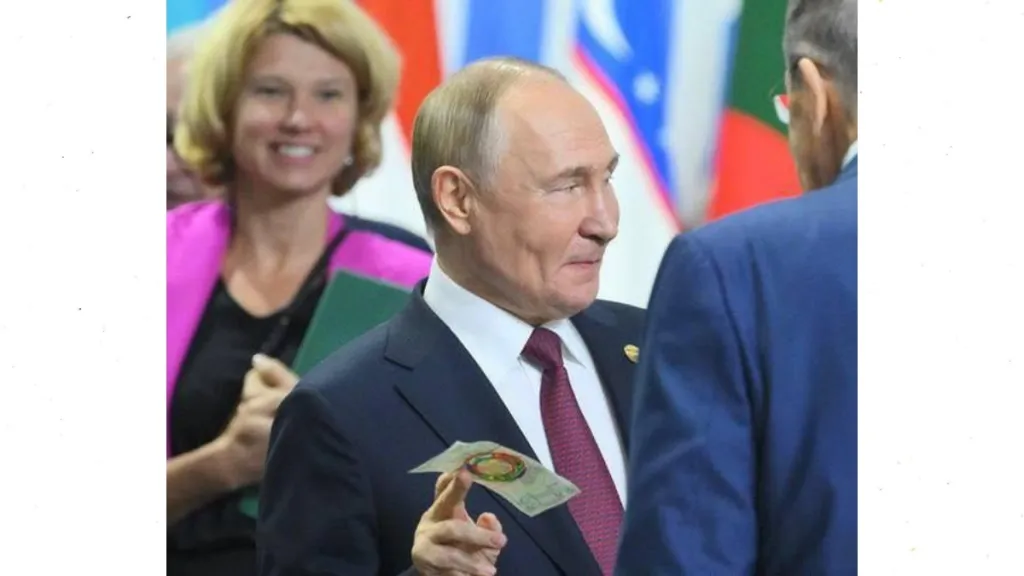
https://www.financialexpress.com/policy ... e/3648619/
BRICS Unveils Symbolic Banknote, Pushes for Local Currency Trade Amid Dollar Debate
At the BRICS summit in Kazan, a symbolic banknote featuring the flags of member nations was unveiled, sparking discussions on creating alternatives to the US dollar and fostering a more independent economic system.


Re: BRICS: News and Discussion
Amber G. wrote: ↑26 Oct 2024 00:57U.S. Secretary of Defense Lloyd Austin and other defense officials have made statements on BRICS and NATO, but I couldn't find direct quotes specifically stating 'direct quotes specifically stating "not allowing BRICS expansion' .. Can you?
The original poster from X (from Kim Dotcom ), IMO is perhaps could be called a "dolt" or worse by making up and posting such comments in the hope some people will fall for it or even amplify it.
This was a satirical internet meme post -- ie. Lloyd Austen never actually said that -- it was posted that way to put the shoe on the other foot.
Re: BRICS: News and Discussion
UN Gen Scy attending the summit feels more like observing the proceeds to report back to his western masters than anything else.
The BRICS currency note could just be Putin trolling the west to give them a few ulcers!
The BRICS currency note could just be Putin trolling the west to give them a few ulcers!
Re: BRICS: News and Discussion
"The claim that India is an obstacle to Turkey's accession to BRICS is not true," says Turkiye statement... 
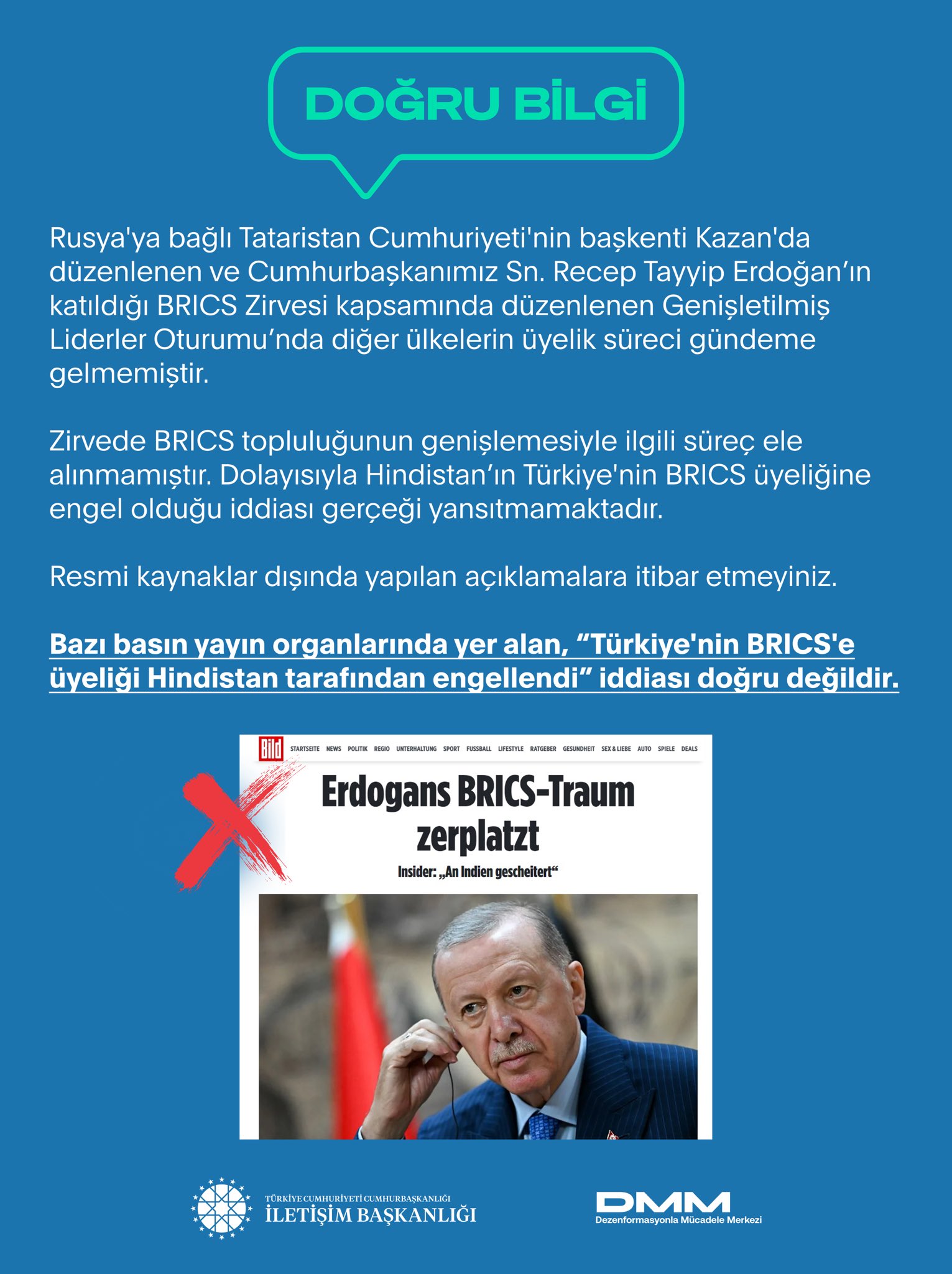

Re: BRICS: News and Discussion
If it goes on like this BRICS could become the new [UN - the West] 
Re: BRICS: News and Discussion
https://adnamerica.com/en/venezuela/bra ... membership
just as a data point, 3 of the 5 members, br, sa, in have denied entry to prospective regional irritants, while the other 2 have not deployed their founder veto in any case till now, keeping the forum more global oriented, interesting placements by all and inadvertently displays the growth ideology of each memberSome reports suggested Brazilian President Luiz Ignacio Lula da Silva made the decision as a result of lack of election transparency in the recent July 28 Venezuelan presidential elections and concerns human rights violations being committed on behalf of Caracas and Managua.
Nicaragua's former ambassador to the Organization of American States (OAS), Arturo McFields, described the decision as a “total humiliation” for the communist Ortega and Maduro regimes.
“They did not manage to integrate into the BRICS,” McFields said. “They did not even manage to be considered at some point. Brazil, as a founding member of the group, said no. It is a sweet revenge from Lula after the humiliations of the Nicaraguan dictatorship and the insults issued by Ortega,” he explained.
He then said the intergovernmental organization’s decision was a reversal for Ortega who is used to getting his way.
“Ortega is used to insulting, humiliating and getting his way, but Lula responded in a very subtle and forceful way, leaving him out of the BRICS,” he explained. “[Nicaragua and Venezuela] were not only humiliated by the democracies of the world, but also by these great powers that are sympathizers of a radical left.”
Re: BRICS: News and Discussion
I am curious as to charter of Brics. Does everyone have a veto especially the new countries added. Is there a "founder member " veto ?. If everyone gets veto then how will they work with consensus ? Are regional issues discussed at meetings
Re: BRICS: News and Discussion
Maybe this can answer some of your questions..
http://www.brics.utoronto.ca/docs/BRICS ... s-2023.pdf
Re: BRICS: News and Discussion
A highly insightful discussion, please listen to it when you have time
BRICS plans to transform the international monetary and financial system, and discussed policies at the 2024 summit in Kazan, Russia. Can it successfully challenge the dominance of the US dollar? Political economist Radhika Desai is joined by Ben Norton and former central banker Kathleen Tyson, author of the book "Multicurrency Mercantilism".
BRICS plans to transform the international monetary and financial system, and discussed policies at the 2024 summit in Kazan, Russia. Can it successfully challenge the dominance of the US dollar? Political economist Radhika Desai is joined by Ben Norton and former central banker Kathleen Tyson, author of the book "Multicurrency Mercantilism".
Re: BRICS: News and Discussion
Discussion between Abhijit Chavda and Kushal Mehra on BRICS
Re: BRICS: News and Discussion
Russia wants to leave open to prospective applicants the possibility of being in both cramps -- ie. to get benefits from BRICS while also enjoying the benefits of being in SWIFT.
I think that's a very smart strategy.
I think that's a very smart strategy.
Re: BRICS: News and Discussion
As far as trading arrangements and facilities go, BRICS may not be restrictive like the West. That will be its USP. We are not exclusive. But it will force the West to do the same. If they do not, many nations will get irked and look for a reason to leave Western structures.
Re: BRICS: News and Discussion
posting it here instead of the geopolitics thread as subject more pertinent to this thread title
south america always had the potential to be the strategic depth of europe, now that eu is finding it difficult to compete with different world powers at various stages, it is an ideal time for them to rekindle this alliance
https://ecfr.eu/publication/brazil-euro ... bal-south/
south america always had the potential to be the strategic depth of europe, now that eu is finding it difficult to compete with different world powers at various stages, it is an ideal time for them to rekindle this alliance
https://ecfr.eu/publication/brazil-euro ... bal-south/
Europeans are looking for friends. As the global order fragments and reorders amid escalating US-China tensions, the rise of assertive “middle powers,” and growing scepticism toward the international rules-based system, Europe finds itself increasingly isolated in the global south. To secure its position and avoid being drawn into a new cold war dynamic between Washington and Beijing (which will likely be exacerbated by Donald Trump’s re-election to the White House), Europe must balance its strong transatlantic alliance with the building of new partnerships with emerging powers, particularly those shaping this new reality.
Beneath the varying ideological rhetoric of presidents such as Lula, Fernando Henrique Cardoso, and even Bolsonaro, some core elements of Brazilian foreign policy have largely endured, with differences between administrations being often of degree of emphasis rather than shifts in direction. This is also seen in Brazil’s relatively stable voting patterns at the UN, particularly evident in the context of Russia’s invasion of Ukraine. Brazil tends to support international law and condemn its violations, yet simultaneously rejects great power interference in other countries’ internal affairs, including through the use of economic sanctions as an instrument of pressure.
Brazil’s stable geopolitical context has allowed it a high level of independence from Washington, including in security affairs. Under Lula in particular, Brazil openly embraces a post-US global order, where the focus is for the US to take on a different role rather than leading the world.
Much like other middle powers, multipolarity is welcomed as an opportunity to increase its influence in international institutions and to wield greater global influence. Resisting alignment with either the US or China, in what Lula refers to as a “mentality of the Cold War,” Brazil, like many other middle powers, strategically hedges between the two, capitalising on opportunities created by competition between them – opportunities that were unavailable during the era of US dominance. Brazil seems to enjoy living in an “à la carte world”, although this sometimes requires it to walk a fine line – exemplified by when it recently signalled it would not be joining China’s Belt and Road Initiative.
Like other Latin American countries, such as Chile and Argentina, Brazil leverages investment, infrastructure projects, and trade deals from both superpowers. In contrast, countries like Mexico or Colombia have less room to manoeuvre due to their deeper economic, geographic, or security dependence on the US, making them more constrained in navigating the competition. Such hedging strategy also allows Brazil to prepare for diverse scenarios arising from the US-China rivalry, reminiscent of its approach during the second world war when it maintained neutrality between Nazi Germany and the Allies until circumstances made alignment with the Allies more beneficial to its national interests.
Brazil under Lula uses the approach of “active non-alignment”, or “logic of autonomy”, as some Latin American scholars describe it, to try and position itself as an autonomous actor and a mediator in international disputes, notably the war in Ukraine and tensions in Venezuela (which have seen limited success, as this paper later explores.) As part of this, Lula’s Brazil often seeks to act as a broker or bridge between the West and the global south, as a rare example of a major country that can present itself as part of both. Indeed, despite its distancing from the West under Lula, Brazil’s strong economic ties with Western countries, involvement in Western-led groups like the G20, and its status as one of the world’s largest liberal democracies, all strengthen its perception in the global south as having a foothold in the West. This role as broker or bridge is a key part of Brazil’s strategy to project power and influence on the global stage, a long-standing ambition of Brazil’s foreign policy.
Yet, within this continuity, there are notable differences between Brazilian administrations in how they perceive the scope of Brazil’s international role. While successive governments agree on Brazil's potential as a major international player, they differ in the degree of engagement with global affairs. For instance, President Fernando Henrique Cardoso’s Brazil focused its diplomatic efforts on regional stability and protection of its interests from great powers. Cardoso emphasised a more cautious and measured foreign policy that aimed to exert influence without overstretching its resources, viewing integration as a way to build the country’s autonomy.
In contrast, Lula views Brazil as more than just a middle power; he sees it as a “grande nação” (great nation), a major emerging global power that deserves a greater voice in international institutions and should actively address critical global issues, from non-proliferation to climate action – evident in his 2023 and 2024 interventions at the United Nations General Assembly. Rather than simply participating in multilateral frameworks to safeguard Brazil’s interests from other great powers, Lula aims to reshape these institutions and build coalitions that can challenge Western dominance, asserting Brazil as a key architect in global governance.
Still, this approach does not enjoy universal support in Brazil, where many, especially Lula’s conservative opponents, consider it a dangerous overreach.
Lacking military power, Brazil has harnessed international institutions, norms, and coalitions to exert influence and advance its interests on the global stage, leading the country to champion multilateralism as a cornerstone of its foreign policy. Like Europe, Brazil relies on a well-functioning trading system, with its economic model deeply intertwined with the global economy. Disruptions to trade – such as protectionist policies or breakdowns in multilateral trade agreements – pose significant threats to its national development. This is an overriding priority for Brazilian administrations and a major driver of foreign policy, as long-term economic growth is enshrined in Article 4 of the Brazilian constitution.
In particular, one of Brazil’s most enduring foreign policy priorities is its bid for a permanent seat at the UNSC, as part of the G4 coalition alongside Germany, India, and Japan. While it enjoys rhetorical support from some Europeans (including Germany, France, and the UK), it lacks the crucial backing of the US – whose officials recently suggested that Germany, India, and Japan should get a seat, notably omitting Brazil.
Brazil’s foreign policy continuity can be partly attributed to the country’s very own “deep state”: its ministry of foreign affairs, known as Itamaraty. Renowned for its professionalism, esprit de corps, and capacity to instil vision and long-term perspective in Brazil’s foreign policy, Itamaraty provides a robust bureaucratic framework capable of weathering fluctuations in domestic politics and shifts in presidential ideological preferences. With over 200 embassies, consulates, and permanent missions worldwide, staffed by approximately 1,500 diplomats, Itamaraty ranks among the top 10 diplomatic powers in the world. This positions Brazil as one of the countries with the most extensive diplomatic reach in the global south, alongside Turkey and India.
Brazil is no exception. It has several characteristics of a great power. It is the world’s fifth-largest country by area, seventh largest by population, and eighth largest by GDP – behind only the US, China, Germany, Japan, India, United Kingdom, and France. Its diplomats and commentators tend to call Brazil a continental power, or a “monster country” (in reference to George Kennan’s concept, which also described the US, China, India, and Russia). This allows them to argue that Brazil’s interests go beyond merely achieving a certain outcome and encompass its influence in how global affairs are managed.
But Brazil has major weaknesses too. It is only the 14th largest military spender, trailing behind Italy and just ahead of Canada. Its military insignificance presents one of the obstacles in convincing other nations that it deserves a permanent seat in the UNSC.
Brazil often focuses on issues where it can harness its credibility and hard-won recognition, such as fighting climate change, poverty, and hunger – major development challenges that are also the priorities of its G20 presidency this year. As a major agri-food producer and guardian of the Amazon, Brazil currently views environmental preservation and sustainability as essential to its international policy.
The country also increasingly tries to play a constructive role in resolving international conflicts, harnessing its non-membership of any military alliance and its diplomatic strength. Under the previous Lula administrations (2003-2010), it was part of an initiative regarding the Iranian nuclear programme. It also sent peacekeeping missions to Lusophone Africa and lead the military component of an UN-backed peacekeeping mission to Haiti. (However, the latter experience is remembered in Brazil as a disaster, as it not only failed to secure the Caribbean nation but also contributed to the militarisation of the government under Bolsonaro. This helps explain Lula’s current reluctance to contribute to a new mission in Haiti.)
Therefore, Brazilian government has dedicated significant resources and attention to its first presidency of the G20, seeing the leaders’ summit in November in Rio de Janeiro as a pivotal moment (alongside the COP30 climate conference in Belém in 2025) to enhance the country’s global prominence and reaffirm its power status. In light of the criticisms regarding the G20’s waning relevance (for example, during the covid-19 pandemic), Brazil has proposed a pragmatic agenda aimed at restoring the group’s G20 credibility as a forum capable of addressing main global problems, such as climate change and poverty.
In our conversations, [1]Brazilian experts and diplomats presented the G20 as a parallel institution to the UN, through which agreements could pave the way for changes in larger international institutions. They also considered it as an essential platform for discussions on global governance, benefitting from a smaller size than the UN, which permits more streamlined negotiations and generating momentum for broader talks. Informally, some of these experts talked of changing the system “from within the system but not from within its institutions”. What they mean is that, while today’s global governance could be reformed rather than remade from scratch, one should not expect a reformist drive to come from within institutions such as IMF, the World Trade Organization, or the World Bank themselves. In this context, the G20 is seen as a rare example of a narrower forum that represents all the world’s main power centres of today, including the US and China.
BRICS serves a different purpose compared to the G20. As one of our interlocutors remarked, “life isn’t easy for anyone inside this club”. It’s obvious that major divisions exist among its original members, particularly between China and India. Additionally, from Brazil’s perspective, the ongoing enlargement of BRICS – an initiative Brazil sought to derail because it dilutes the group’s identity and Brazil’s weight within it – poses challenges to its own agenda. From Brazil’s perspective, expansion makes the group lose its defining characteristic – an exclusive forum for the most powerful countries in the global south. It reduces the relative weight of the Americas within the mix – especially following Argentina’s rejection of membership under its new president. It places democratic countries in the minority while bringing in more autocracies, such as Saudi Arabia (which is hesitating to join, to not antagonise the US) and Iran, in addition to some of the world’s major air polluters. And it risks becoming a China-led club. For these reasons, Brazil has helped create a membership category called “BRICS partners”, now comprising 10 countries, including Cuba, Bolivia, and Turkey, the latter of which Brazil supports in becoming a full member.
In addition, largely due to the legacy of the cold war, cooperation has also been difficult in a region divided between left-wing and right-wing governments. Some scholars point to an inherent contradiction between rhetorical emphasis on greater regional integration and the strong political attachment of most countries in the region to a rigid understanding of national sovereignty. Having experienced European colonialism and US interference, the region tends to display strict opposition to military interventions.
However, an important evolution on this last point must be acknowledged. In 2004, Brazil reframed its position to one of “non-indifference” to situations that threat international peace and security, which justified its involvement in the UN’s stabilisation mission in Haiti. And in 2011, under President Dilma Rousseff – and in reaction to a NATO-led intervention in Libya – it proposed the concept of “responsibility while protecting”, as a middle-ground between the principles of “non-intervention” and “responsibility to protect” that would make civilian protection interventions more accountable and proportionate.
Brazil’s activist diplomacy as a non-aligned country has yielded limited results beyond the attention that it has received.
While its desire to mediate conflicts is a means to enhance its prestige, Brazil is often seen as lacking the necessary influence in high-stakes global security issues. Its unsuccessful mediation between Iran and the West in 2010 – when other countries, especially the US, didn’t consider its contribution as useful or even trustworthy – highlights Brazil’s tendency to overextend itself. The same can be said about the war in Ukraine, where Brazil initially pushed for peace negotiations, but then refused to participate in the peace conference organised by Switzerland. Being part of BRICS alongside Russia and relying on imports of fertilisers from that country and exports of food and raw materials to China, limits Brazil’s credibility as honest broker in the eyes of Ukrainians and the EU.
Brazil’s attempt to reform the “agendas” of international governance – by making multilateral bodies, for example, more responsive to issues like climate change and social inclusion – holds promise, but Brazil must demonstrate its commitment to prioritising that goal over the never-ending discussions about securing a permanent UNSC seat.
finally, some lessons learned by the eu sermonising babucracyBrazil has, like other middle powers, focused its diplomacy on enhancing international presence and status. For Brazil, getting a seat at the table and achieving recognition as a middle power has involved two sets of strategies, corresponding to what scholar Arnold Wolfers identified as “possession” and “milieu” goals. Possession goals are competitive, seeking to increase one’s international influence. Milieu goals are cooperative, aimed at supporting public goods that a country relies on, such as promoting peace and security, international law or international institutions. These two sets of goals can be complementary but can also be contradictory. In the case of Brazil’s activist diplomacy these tensions have been evident.
On the one hand, Brasilia has sought to reform the world’s current order, arguing, not without reason, that it is unfair due to asymmetries of power, Western dominance, double standards in international law and the use of force, and insufficient attention to providing public goods that would benefit the global south. This is a typical milieu goal. By emphasising south-south cooperation, peace, mediation, and supporting more inclusive international institutions, such as the G20, Brazil has given voice to the legitimate concerns of the post-colonial nations in Latin America, Africa, and Asia, thus gaining influence as a defender of a fairer international order.
In parallel, Brazil’s dealings within the BRICS reflect a very classical and realist practice of international power and diplomacy, which, due to its zero-sum nature, corresponds to a very typical possession goal.
At the beginning, Europe did not perceive the BRICS as a direct challenge to the international system, and considered that Lula, during his first stint as president, was simply seeking recognition and a place at the table. At that time, G7 members recognised the value of south-south cooperation and believed they could accommodate BRICS through different strategies, such as trade and development cooperation (many EU countries, after all, welcomed and signed up to the Belt and Road Initiative).
A good place to start is by recognising each other’s structural differences that predispose them to different orientations in global policy. For example, while Brazil is located far away from major conflicts, Europe is surrounded by wars, making it much more dependent on the US for security. Also, Brazil is underrepresented in multilateral institutions, whereas Europe enjoys a strong presence in them; this disparity makes the issue of voice central to Brazil but underappreciated from Europe’s perspective. Brazil has both a Western and a global south hat (and does not want to be perceived as too much in any of these camps) whereas Europe is firmly in the West (even when it tries to differentiate itself from America). And finally, Brazil is both post and anti-colonial, while Europe’s global credibility continues to be tarnished by its colonial legacy, posing obstacles in its relations with the global south.
When discussing Ukraine with Brazil, Europeans should defend their positions in a non-moralising way. Instead, they should emphasise that, from Europe’s perspective, this war is existential. The need to champion international law is also in Brazil’s interest. But there are limits to what one can expect from Brazil, as German Chancellor, Olaf Scholz, learned very quickly when he tried to convince Lula to sell German-made air defence tanks and munitions to help Ukraine’s war effort. Rather than exposing themselves again to an easy rebuke, Europeans should engage in an honest exchange about Brazil’s peace-making effort – pointing to its limited results and suggesting ways in which it could be more successful.
Europeans should show their support for Brazil’s constructive ideas on the reform of the multilateralism’s “agendas” as part of G20 discussions. They should also work closely with Brazil in international forums on global challenges that both sides prioritise, such as climate action and climate financing, especially with Brazil set to host the COP30 in 2025. This collaboration should also help shield those topics from domestic changes inside Brazil.
By supporting Brazil’s role within the G20, the EU can effectively counterbalance its criticisms of Brazil’s endorsement of the BRICS’ Kazan Declaration – an assertion that claims to strengthen “multilateralism for just global development and security,” even as Russia continues to pose a significant threat to Europe’s security. It is essential for Europeans to engage Brazilians in recognising that these statements are neither neutral nor harmless; rather, they help legitimise Russia’s aggressive actions and reveal that the global south also has its troubling double standards regarding international law and security
In other words, Europeans have an interest in seeing Brazil focus more on G20 than on BRICS – which Brazilians might also conclude is necessary, given the direction in which the latter group is heading.
But that requires efforts from both sides. While Europeans need to revise their approach to Brazil, they will need to convince Brazilian decision-makers to update their approach to Europe too. As things stand today, decision-makers do not seem to recognise the EU as a go-to partner to advance a revitalised multilateralism or a vision of global order that aligns with the country’s goals and challenges. And this stems from not only Europe’s shortcomings but also from Brazil’s own illusions and misconceptions, such as its belief that it can continue using the US-China rivalry to its political and economic advantage. Also, Brazilian leaders need to recognise how damaging their poorly designed peace initiatives for Ukraine have been for the EU-Brazil bilateral relations.
Europe might have been a secondary partner for Brazil in the first two decades of the 21st century, dominated by the “rise of the Rest". But as BRICS undergoes a major transformation, the US-China rivalry heats up, and multilateralism crumbles, Europe has strong cards to position itself as Brazil's much-needed partner for decades to come. But it will need to respect Brazil’s own needs and aspirations. If it wants to dance with Brazil, it first needs to learn the samba steps.
Re: BRICS: News and Discussion
@KanwalSibal
These kind of open threats will only put the backs up of other countries. Trump is there for 4 years. Movement away from the dollar is not a 4 year affair. It will take much longer but such threats will accelerate the process.
https://x.com/KanwalSibal/status/1863131567524102629
These kind of open threats will only put the backs up of other countries. Trump is there for 4 years. Movement away from the dollar is not a 4 year affair. It will take much longer but such threats will accelerate the process.
https://x.com/KanwalSibal/status/1863131567524102629
Re: BRICS: News and Discussion
Thanks for posting the above on Brazil ricky Ji.
There is a trade deal that EU wants to sign with Brazil and other south American countries called MERCOSUR which is facing resistance from farmers within EU countries. Strangely this article doesn't mention it.
Secondly, it would be interesting to see a similar EU perspective on India, which has been on a much higher arc of development and influence for the past 3 decades than Brazil.
There is a trade deal that EU wants to sign with Brazil and other south American countries called MERCOSUR which is facing resistance from farmers within EU countries. Strangely this article doesn't mention it.
Secondly, it would be interesting to see a similar EU perspective on India, which has been on a much higher arc of development and influence for the past 3 decades than Brazil.
Re: BRICS: News and Discussion
article does not really say anything besides the fact the indonesia has joined brics
https://www.aspistrategist.org.au/joini ... -strategy/
https://www.aspistrategist.org.au/joini ... -strategy/
Indonesia’s decision to join BRICS is no strategic pivot but a continuation of its multi-alignment foreign policy. However, Indonesia will need to navigate internal BRICS dynamics while maintaining ties with the West and its leadership role in the Association of Southeast Asian Nations.
Although framed domestically as a step forwards in strengthening economic growth through South-South cooperation, the move is leverage in its dealings with the West and preserves Indonesian President Prabowo Subianto’s approach of ‘friends to all, enemy to none’. Having long participated in BRICS summits as an observer, Indonesia’s formal admission in early 2025 aligns with its commitment to equilibrium through multi-alignment, shown through a parallel application to the Organisation for Economic Co-operation and Development.
Despite tensions, joining BRICS aligns with Indonesia’s interest to engage with non-traditional markets. Economic opportunities within BRICS are significant but not without caveats. Collaborations could facilitate investments in infrastructure, technology and public health, supporting Prabowo’s domestic agenda. Partnerships with Brazil and Russia could enhance food and energy security, while China and India may provide technological expertise.
However, such initiatives as the BRICS Technology Transfer Center Network, which was proposed by China in 2018, raise concerns about intellectual property protection and equitable benefit-sharing. It is unclear to what extent the arrangements would protect Indonesia’s intellectual property and that of other countries. Jakarta must ensure these arrangements safeguard its interests to maximise the benefits of membership.
Nevertheless, Indonesia’s engagement with BRICS could raise concerns about its leadership role in ASEAN as it risks stretching its resources too thin. As Southeast Asia’s largest economy, Indonesia has traditionally driven ASEAN-led initiatives. While BRICS membership may enhance Jakarta’s global leverage, it risks diverting resources from regional commitments. Indonesia must ensure its participation complements, rather than undermines, ASEAN’s collective interests.
Ultimately, Indonesia’s success within BRICS depends on its ability to meaningfully contribute while safeguarding its national interests. Beyond being a symbolic addition, Indonesia must leverage its position as a regional leader to advocate practical and actionable goals. This includes promoting inclusivity within BRICS, shaping its agenda toward global economic equitability and ensuring it complements ASEAN commitments. With strategic vision and skilled diplomacy, Indonesia can use BRICS to advance its interests while contributing to a more balanced global order.
Re: BRICS: News and Discussion
https://packaged-media.redd.it/mkgp3aws ... 32e5231294
BRICS is dead, or at least will be in hibernation at least until Trump is gone. Now we can put a stop to all this de-dollarization fantasies and instead focus on something credible.
BRICS is dead, or at least will be in hibernation at least until Trump is gone. Now we can put a stop to all this de-dollarization fantasies and instead focus on something credible.
-
Mort Walker
- BRF Oldie
- Posts: 10432
- Joined: 31 May 2004 11:31
- Location: The rings around Uranus.
Re: BRICS: News and Discussion
I don't think so. It will have less emphasis on China & more on the ME countries, energy and IMEC. If the Russia-Ukraine war can be wrapped up, would be a big positive.Jay wrote: ↑14 Feb 2025 08:48 https://packaged-media.redd.it/mkgp3aws ... 32e5231294
BRICS is dead, or at least will be in hibernation at least until Trump is gone. Now we can put a stop to all this de-dollarization fantasies and instead focus on something credible.
Re: BRICS: News and Discussion
BRICS currency was never happening. It's a red herring Trump is trumpeting for his own ends. Dedollarization - actually less use of USD by just using own currencies whenever possible for bilateral trade is a fundamental right of every country and cannot be stopped. If Trump gets too aggressive even for this then the countries will simply use USD quotations for resources and commodities as reference and negotiate between them and finally barter goods. Then what?!
Some of that is already happening.
Some of that is already happening.
